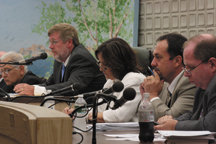Saying it should address city business first, Bayonne City Council voted to move the public comment period to the end of its meeting, ending a tradition largely unique to Bayonne that had allowed residents five minutes at the beginning of each meeting to make statements on any subject.
Residents will still be able to speak during the meeting on any ordinance or resolution that is about to come up for a vote, but comments about other topics must come at the end.
City Council President Terrence Ruane said the five minutes allowed for each speaker has been misused at times by people trying to “campaign, malign, and diminish the dignity of the council.”
Despite critics who urged the City Council to maintain the original policy, he said the public will still enjoy the same right to speak – after the council has done business.
Members of the public who want to speak at the end must also make their requests in writing to the city clerk in advance of the meeting.
“People will still be permitted to speak at the end of each meeting on any subject if they give prior notice.” – Council President Terrence Ruane
________
“The shifting of the public comment period from the beginning to the end reflects the council’s and the administration’s desire to focus the council meetings on the business of the city first,” he said. “People will still be permitted to speak at the end of each meeting on any subject if they give prior notice.”
Ruane added, “The ability of the public to express itself is not being diminished in any way.”
He noted that people can also privately address concerns with the mayor, or with any of the council members.
Residents still concerned
But residents speaking out against the change said meeting with public officials privately is not the same, and that raising issues in public may generate open discussion among other residents.
Very few residents make use of the public comment period – although it becomes a popular venue during elections when prospective candidates use it as a platform. But it has been the venue for some raucous and often defamatory statements, such as when a resident last year called for then-Councilman Gary La Pelusa to resign because of an investigation of legislative aide paychecks he got from Assemblyman Anthony Chiappone.
Two years ago, one resident used the platform during Mark Smith’s first election for mayor to challenge Smith’s record as a heroic cop.
Several times, then-Council President Vincent Lo Re ordered police to escort speakers out of the chambers as a result of remarks made during the public session.
Public meetings are televised live. But critics say rebroadcasts are sometimes edited, and so unless the television audience stays up through the entire live broadcast, the public comments at the end may be lost.
The move, some claim, may even discourage people from making comments at all, since meetings sometimes run late. In addition, the council sometimes goes into closed session for issues, making meetings longer.
At what is likely to be the last public comment period at the beginning of the meeting, Mickey Shemin said he was opposed to the change. “It is not a good idea to put people on the back burner,” he said. “I think it is much better to let people talk at the beginning of the meeting. Some people might not be able to wait for the whole meeting.”
The resolution was placed on the “consent agenda” portion of the public meeting agenda (meaning that none of the council people were opposed to it). Several residents spoke against it and one in favor.
Richard Barbara said he used the public comment period to highlight important issues.
“I take offense to Mr. Ruane saying people come up here to grandstand. I am not grandstanding,” he said. “People ask me questions and I come here and ask the City Council those questions.”
He asked about elderly or disabled people who wish to speak. “Why should a disabled person or senior citizen have to wait two or three hours to speak?” he said. “I feel that if people come to the citizen council meetings, they should be able to address the City Council.”
Councilman Joe Hurley said many senior citizen resolutions are passed by the council and that these generally come at the end of the meeting.
“They would have to wait anyway,” he said. “But if you really feel strongly about an issue, does it matter if you speak at the beginning of the meeting or at the end? I don’t see the big deal.”
City Clerk Bob Sloan said it is likely that council would likely make exception for a disabled person or a senior citizen as the case arises.
Neil Barton, who runs a local information website, said it bothered him that what was an exceptional policy for openness is being taken away, but suggested several compromises, including holding the public portion prior to going into any closed sessions.
Other residents suggested the city might have a Town Hall meeting to allow people to speak freely.
Michael Smith, unrelated to Mayor Mark Smith, supported the council’s move.
“I think it’s better we move the speaking until the end of the meeting,” he said. “If you have a long list of people speaking and each one gets five minutes, city business can be put off for a long time.”
